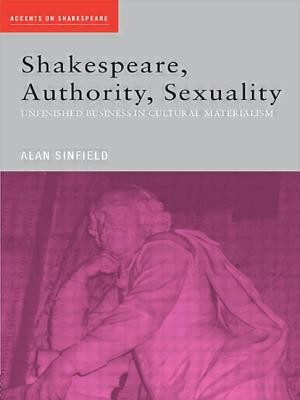
- We will send in 10–14 business days.
- Author: Alan Sinfield
- Publisher: Routledge
- ISBN-10: 0415402360
- ISBN-13: 9780415402361
- Format: 14.1 x 21.7 x 1.4 cm, minkšti viršeliai
- Language: English
- SAVE -10% with code: EXTRA
Reviews
Description
Shakespeare, Authority, Sexuality is a powerful reassessment of cultural materialism as a way of understanding textuality, history and culture, by one of the founding figures of this critical movement. Alan Sinfield examines cultural materialism both as a body of ongoing argument and as it informs particular works by Shakespeare and his contemporaries, especially in relation to sexuality in early-modern England and queer theory.
The book has several interlocking preoccupations:
- theories of textuality and reading
- the political location of Shakespearean plays and the organisation of literary culture today
- the operation of state power in the early-modern period and the scope for dissidence
- the sex/gender system in that period and the application of queer theory in history.
These preoccupations are explored in and around a range of works by Shakespeare and his contemporaries. Throughout the book Sinfield re-presents cultural materialism, framing it not as a set of propositions, as has often been done, but as a cluster of unresolved problems. His brilliant, lucid and committed readings demonstrate that the 'unfinished business' of cultural materialism - and Sinfield's work in particular - will long continue to produce new questions and challenges for the fields of Shakespeare and Renaissance Studies.
EXTRA 10 % discount with code: EXTRA
The promotion ends in 23d.11:43:51
The discount code is valid when purchasing from 10 €. Discounts do not stack.
- Author: Alan Sinfield
- Publisher: Routledge
- ISBN-10: 0415402360
- ISBN-13: 9780415402361
- Format: 14.1 x 21.7 x 1.4 cm, minkšti viršeliai
- Language: English English
Shakespeare, Authority, Sexuality is a powerful reassessment of cultural materialism as a way of understanding textuality, history and culture, by one of the founding figures of this critical movement. Alan Sinfield examines cultural materialism both as a body of ongoing argument and as it informs particular works by Shakespeare and his contemporaries, especially in relation to sexuality in early-modern England and queer theory.
The book has several interlocking preoccupations:
- theories of textuality and reading
- the political location of Shakespearean plays and the organisation of literary culture today
- the operation of state power in the early-modern period and the scope for dissidence
- the sex/gender system in that period and the application of queer theory in history.
These preoccupations are explored in and around a range of works by Shakespeare and his contemporaries. Throughout the book Sinfield re-presents cultural materialism, framing it not as a set of propositions, as has often been done, but as a cluster of unresolved problems. His brilliant, lucid and committed readings demonstrate that the 'unfinished business' of cultural materialism - and Sinfield's work in particular - will long continue to produce new questions and challenges for the fields of Shakespeare and Renaissance Studies.


Reviews